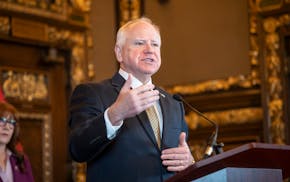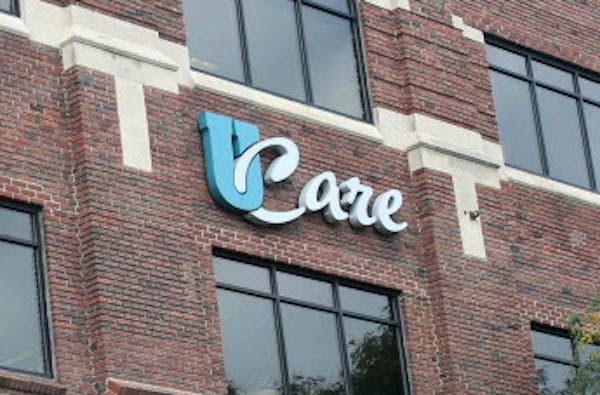UCare will pay $100 million to support a variety of health care programs at the University of Minnesota, while the U will relinquish its majority on the HMO's board of directors, as part of a legal settlement that redesigns their long-standing collaboration.
The agreement, announced Friday, will close litigation the U brought in November 2022 to stop the nonprofit health insurer from expanding its board and thereby diminishing the university's historic influence at the Minneapolis-based health plan.
The U's Department of Family Medicine created UCare in 1984, and the university currently appoints eight of 15 board members.
Over the years, UCare has provided financial support to the U, including payments to the family medicine department that totaled about $28 million between 2018 and 2021.
The settlement calls for UCare funding to be split into four $25 million payments over the next three years. The money will let the university make investments for better access to health care across rural and certain urban communities while improving programs for family medicine, mental health and aging residents.
"UCare and the University of Minnesota share a commitment to improving the health of historically marginalized Minnesotans who experience health inequities," they said in a joint statement. "With that commitment as their foundation, UCare and the University are reshaping their relationship in ways that will strengthen health care services for many Minnesotans who need them most."
UCare is one of Minnesota's 10 largest nonprofit groups, a list that's dominated by health care providers like the Mayo Clinic and insurers like Blue Cross and Blue Shield of Minnesota.
At the outset of litigation, the office of Minnesota Attorney General Keith Ellison said it was monitoring the situation. Ellison has oversight responsibility for charitable assets held by nonprofits, and the attorney general at the time said in a court filing "the public interest would be best served if the parties could avoid a costly public dispute."
On Friday, a spokesman for Ellison said in a statement: "The attorney general has always supported the parties resolving this dispute voluntarily so they can focus their collective resources on benefiting Minnesotans."
The agreement specifies four areas where the U will make investments with the UCare funding.
The university is considering ways to promote health equity and address access problems. Options include an expansion of services at two existing Minneapolis clinics — Broadway Family Medicine Clinic in the Willard-Hay neighborhood and Community University Health Center in the Ventura Village neighborhood, according to a news release.
In rural parts of the state, the U will consider improvements in telehealth training and community education plus developing clinics in underserved areas.
The university also might expand training and services in mental health care and develop new clinics for aging residents. Under the heading of family medicine, the U will look at ways to expand primary care access while meeting the needs of family medicine trainees.
"UCare's renewed support for the University's community clinics and expanded health and wellness initiatives across the state have the potential to change the lives of underserved Minnesotans, particularly those who face barriers to care," said Dr. Jakub Tolar, dean of the U's Medical School, in a statement.
UCare has been distinct from other carriers by focusing on coverage for people who qualify for government-sponsored benefits. Currently, the health plan is the state's largest HMO for Minnesotans covered by Medicaid, the state-federal program for lower-income and disabled residents.
Medicaid HMOs last year reported unusually large profits from state-administered managed care contracts in Minnesota. UCare led the way with operating income of $276.4 million.
After factoring investment gains as wells profit from selling Medicare Advantage coverage, UCare last year posted $325.7 million in net income on nearly $6.1 billion in revenue.
Leaders of the HMO say the new agreement with the U clears the way for more growth at UCare including a board with more consumer representation, diversity and business expertise.
Partly redacted sections from the U's lawsuit suggest the university opposed a 2017 plan for UCare to merge with Fairview Health Services, as well as UCare's attempt last year to a win a managed care contract in Iowa's Medicaid program.
Currently, UCare is preparing to bid on a Medicaid contract in Kansas.
"The next chapter of our work with the University of Minnesota to advance excellent patient care in marginalized communities — as well as primary care education and training — is extremely meaningful," said Hilary Marden-Resnik, UCare's chief executive, in a statement. "UCare's three-year community investment propels the University of Minnesota Medical School's mission to increase access to high-quality health care and improve wellness in underserved communities."
After the U filed its lawsuit, a Hennepin County judge in December temporarily blocked UCare from expanding membership on its board of directors. A scheduling order for the case this summer indicated that a trial might have happened during the second half of 2024.

Travel experts discover solo fare hike at Delta, other top carriers as fresh way to upcharge

In first speech back, UnitedHealth's new CEO pledges to review hot-button issues

A child had measles at Mall of America, concerning state health officials who don't know source

Ramstad: Gov. Walz, things are not getting done in Minnesota

